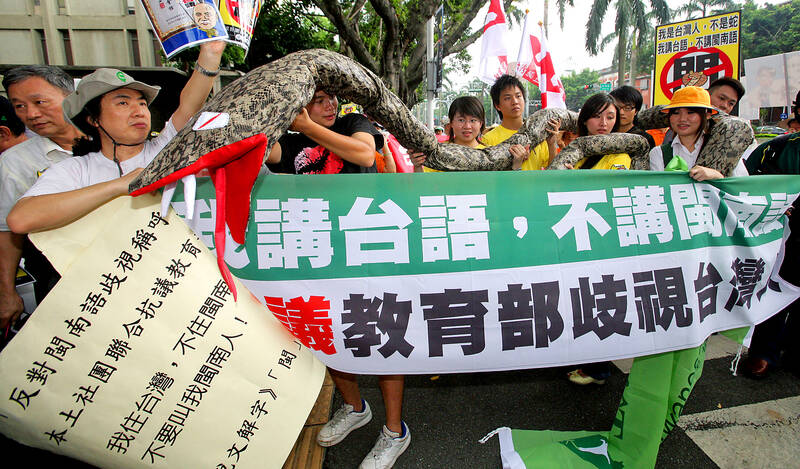Language rights advocates and groups supporting “Taiwanization” have called on the government to change its linguistic designation for Hoklo (commonly known as Taiwanese) from Minnanyu (閩南語, Southern Min) to Taiyu (台語).
The word Minnan has overtones of racial discrimination, and in the past, the Chinese Nationalist Party (KMT) authoritarian government used “unlawful” means when designating it the “official name” for Taiyu, Taiwanese Pen Tai-bun Pit-hoe, the Takao Promote Tai-gi-bun Association and other advocacy groups said in a statement.
When Nvidia cofounder and chief executive officer Jensen Huang (黃仁勳), who was born in Tainan, spoke in Hoklo during a recent visit to Taiwan, he referred to the language as Taiyu, the statement said.

Photo: CNA
“Therefore we urge the Ministry of Education to follow the Executive Yuan’s resolution to prioritize the term Taiyu instead of Minnan,” it said
No article in the Constitution, nor any legal provision requires the use of Minnan when referring to Hoklo, the statement added.
Furthermore, the Min (閩) symbol is composed of the radical for door, and the component for insects (虫) or beast, which in ancient times referred to snakes, it said.
“The use of Minnan by northern Chinese was intended as racial discrimination when referring to the people of the Fujian or Minnan region,” the statement said, adding that some textbooks say the term meant “snake people” or “persons crawling on the ground.”
“Therefore Minnan when applied ... to speakers of the language, is like Han Chinese in the past referring to Taiwan’s indigenous people as fan [番, ‘uncivilized, or barbarians’] who spoke fan languages,” the statement said.
The government’s continued use of the term Minnan violates people’s right to language equality and contravenes the Universal Declaration of Linguistic Rights; the UN’s covenants on protecting civil and political rights, and social and cultural rights; and the Development of National Languages Act (國家語言發展法), which went in to effect in 2019, it said.
The groups urged the Ministry of Education “to respect the wishes of Taiwanese, to change the term in school textbooks ... and to take action through an official notification from the ministry” saying that the language should be referred to as Taiyu, not Minnan.
Other organizations involved in the statement included the Taiwanese Romanization Association, the Taiwan-Vietnam Culture Association, Toa-bak-chiu Liam-koa-thoan, National Cheng Kung University’s Department of Taiwanese Literature and the Hoat-Ki Tai-gi Ki-kim-hoe Taiwanese Foundation.

Trips for more than 100,000 international and domestic air travelers could be disrupted as China launches a military exercise around Taiwan today, Taiwan’s Civil Aviation Administration (CAA) said yesterday. The exercise could affect nearly 900 flights scheduled to enter the Taipei Flight Information Region (FIR) during the exercise window, it added. A notice issued by the Chinese Civil Aviation Administration showed there would be seven temporary zones around the Taiwan Strait which would be used for live-fire exercises, lasting from 8am to 6pm today. All aircraft are prohibited from entering during exercise, it says. Taipei FIR has 14 international air routes and

Taiwan lacks effective and cost-efficient armaments to intercept rockets, making the planned “T-Dome” interception system necessary, two experts said on Tuesday. The concerns were raised after China’s military fired two waves of rockets during live-fire drills around Taiwan on Tuesday, part of two-day exercises code-named “Justice Mission 2025.” The first wave involved 17 rockets launched at 9am from Pingtan in China’s Fujian Province, according to Lieutenant General Hsieh Jih-sheng (謝日升) of the Office of the Deputy Chief of the General Staff for Intelligence at the Ministry of National Defense. Those rockets landed 70 nautical miles (129.6km) northeast of Keelung without flying over Taiwan,

The Ministry of National Defense (MND) today released images of the military tracking China’s People's Liberation Army (PLA) movements during the latest round of Chinese drills around Taiwan. The PLA began "Justice Mission 2025" drills today, carrying out live-fire drills, simulated strikes on land and maritime targets, and exercises to blockade the nation's main ports. The exercises are to continue tomorrow, with the PLA announcing sea and air space restrictions for five zones around Taiwan for 10 hours starting from 8:30am. The ministry today released images showing a Chinese J-16 fighter jet tracked by a F-16V Block 20 jet and the

City buses in Taipei and New Taipei City, as well as the Taipei MRT, would on Saturday begin accepting QR code payments from five electronic payment providers, the Taipei Department of Transportation said yesterday. The new option would allow passengers to use the “transportation QR code” feature from EasyWallet, iPass Money, iCash Pay, Jkopay or PXPay Plus. Passengers should open their preferred electronic payment app, select the “transportation code” — not the regular payment code — unlock it, and scan the code at ticket readers or gates, General Planning Division Director-General Liu Kuo-chu (劉國著) said. People should move through the